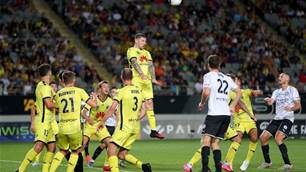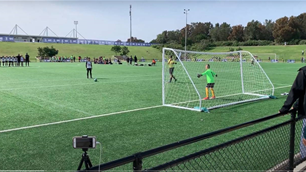On reputations, referees, and respect.
There’s a lot to admire about Ricki Herbert. His statement to the press on Monday about the incident involving Jeronimo Neumann and Ben Sigmund was equal parts enraged and eloquent, especially when compared to his captain’s wonderfully frank post-game interview with Fox Sports. The ire of Herbert and Andrew Durante seems to be well justified, although Wellington have since become muted on the issue, no doubt after a) an unsuccessful appeal and b) a quiet word from the FFA, no doubt raising the spectre of “bringing the game into disrepute”. It’s an interesting concept, that – this idea of doing damage to the brand, of bringing the sport into disrepute. The FFA is quite clear on it in their spectator code of conduct:
“…conduct themselves in a manner that enhances, rather than injures, the reputation of FFA and football generally”
It’s a noble and just idea – but how far does it extend? The findings of the Match Review Panel, which upheld Sigmund’s dismissal by referee Jarrad Gillett, conveniently avoided answering the allegations of whether Jeronimo had or had not thrown himself to the ground in an attempt to get the player sent off. Adam Peacock wrote a rather nice piece on exactly why this decision was, to say the least, puzzling – and to my mind he summed the whole case up rather well with this passage:
“…diving is crap, no matter what the location. Why put up with crap if you don’t have to? And it has nothing to do with how other sports perceive football - it’s about how football perceives itself.”
I found it interesting to note that after the weekend’s incident, after the MRP had made their decision, the news.com.au chain of websites ran with a soccer story about ‘the A-League’s worst divers’. This story, which to my mind is actually having a dig at football, was bizarrely retweeted by some A-League clubs as a news story of interest. Given the typical comments in the media and general public about ‘soft’ soccer players and their ‘stupid’ game, hasn’t the lack of common sense applied by the MRP actually brought the game into disrepute? Wouldn’t making the correct decision, as Peacock outlines, and addressing the issue of diving (on which the league were so strong some time ago).
Perhaps the most amusing thing about the diving saga is that even back in the Baird/Perez days, the Match Review Panel came under fire. If they charged a player there was no right to reply – if they missed an obvious dive, then they were useless and lacked common sense. In fact, throughout the history of the MRP we see news stories littered with controversy, comedy, and cost. It should be pointed out that Wellington Phoenix’s silence could likely be a result of the threat of further financial penalty – every time a member lodges a grievance with the FFA (such as contesting a card, or appealing a charge of bringing the game into disrepute) the governing body receives a non-refundable fee of $500, regardless of the outcome of the charge. Furthermore, in cases where the FFA’s Disciplinary Committee’s judgements are being appealed, there is a further $2000 charged. So not only did Wellington have to suffer the ignominy of their appeals falling on deaf ears, they had to pay $2500 for the privilege. Now this might not seem a great deal of money, especially if you have a rich owner like Tony Sage, but I would imagine there are a fair few football community managers at clubs out there who could do a lot with that amount of money.
The other problem here is that the FFA faces a shortage of referees at the top level of football. Officials are not full-time professionals; their development pathways and conditions have not received the same attention as players in the A-League, and this gap has shown through for some time. With players like Del Piero, Heskey, Ono, Miller etc coming into the league, standards keep rising on the pitch – and yet matches continue to be decided by referees making very questionable calls. Yes, this happens all over the world – but can you really say that the EPL is affected by their contentious decisions nearly as much as the A-League is? Perhaps in a typical weekend of EPL action an official from Manchester or Chelsea will complain about a referee (when do they not?) but for the vast majority of games, we see a consistent flow and a level of professionalism from the whistleblowers. After all, if they lack this they will be demoted back to the Football League until they prove they’re up to scratch!
No such program seems to exist in the A-League. Yes, we are told the FFA have appointed a special head of referees, and development pathways are being examined, but we haven’t seen a difference on the field of play – where the game can potentially be brought into disrepute on any given weekend. People say “don’t blame the ref!”, and with few attention-seeking exceptions they are correct. But we can certainly lay blame at the door of a system which has allowed referees to maintain a stagnant level of performance. The MRP does nothing to solve this – it is a strange gimmick that either undermines the referee or enrages fans; and as discussed earlier, it always seems to wrap itself in controversy.
It would be far better in my mind if the matter is dealt with there and then – whether that means bringing in professionals from overseas (surely referees do not need to be paid the same marquee wages as Del Piero demands) or bringing in some technology (I see goal line technology or a ‘3rd umpire’ style system less of a bastardisation of football tradition than the MRP anyway) - to this author at least it wouldn’t matter. Any action to proactively address the standard of refereeing in the country would surely be seen as a big positive by fans, players, and officials alike. You could even go further, and start to address the fundamental issue that Australia faces when trying to recruit and develop officials: respect. It’s important enough to feature in the spectator code of conduct:
“Respect the decisions of Match Officials and teach children to do the same.”
Yet respect goes further than just people in the stands remaining silent and clapping politely at a poor refereeing decision. Perhaps some of you – those who understand that football co-exists on this planet with many other sports – will have heard of a game called Rugby. I speak of Union rules, not League – and I bring it up because of a phenomenon that seems to exist in that game like no other; you do not fuck with the ref.
I’ve watched rugby games where backchat, an irate outcry, or an offensive gesture has changed the entire flow of the match. The other team receives a penalty; the attacking team is now under pressure. Perhaps a goal or a try results. Maybe the game is turned on its head. In rugby, only the captains speak to the referee – other players only speak to him when spoken to. Can you imagine how many yellow cards would have been dished out in the A-League if this rule was in place? More importantly, can you imagine how the behaviour of players – and fans of A-League teams – would change if they knew questioning the referee could possibly change a game in an instant? A referee in rugby is in control – he lets the game flow, but he sets clear boundaries. In the A-League, shit happens and the referee either can’t keep a handle on things, or he becomes the game – rather than the person there to officiate it. Don’t get me wrong – we do have good referees and good performances – but you cannot tell me they occur on a frequent enough basis.
Bringing in this respect system would, in my mind at least, not only clean up some of the behaviour on the park – it would make refereeing a more attractive option for people throughout football in Australia. A bigger gene pool would allow for the selection of a better breed of referees as a result. Of course, giving Gillett, Green, et al respect only goes so far – if they’re going to have a shocker, they still have a shocker. While Jacob Burns and Matt Smith can’t give them too much lip about it, we’re still left with underperforming refs. But if the FFA also instigated a system whereby referees were reviewed, judged, and demoted in line with poor performances, then we begin to get the best of both worlds. Players realise that refs are under the same pressure to perform as they are, fans know that a few shockers from a ref will see him removed from future games, and the referee himself has a great deal more motivation; knowing that he will receive less drama from players on the park and also that he has people keenly monitoring his performance.
If the referee misses a dive, that’s bad luck. If he misses dives on a consistent basis – well, then perhaps he’s not quite up to scratch and he needs some time off for extra work. Fans don’t have to groan when they see his name on their next team’s fixture, and players know that standards are improving in line with their own levels. Respecting and reviewing referees thus ensures a better outcome for fans, players, and the refs alike.
Wouldn’t that go a long way to ensuring nobody brings the game into disrepute?
Related Articles

Is New Zealand ready for its own A-League derby?

Fresh talent flock to ambitious A-League outfit's pro pathway













